One of the main reasons we love British Columbia so much (and the reason we have stayed 7+ years longer than originally planned!) is because it is possible to explore this huge province and camp in some of the most beautiful spots in the world for free.
This is easily achievable using the amazing BC Recreational Sites and Provincial Parks system.
I also have some of my own tips and tricks, learned after 200+ nights of free camping across this spectacular province.
Here’s all the info you need for learning how to camp for free in British Columbia, Canada.
Updated June 2023. This post includes affiliate links. If you purchase an item through these links, I may receive a small percentage of the sale at no extra cost to you.
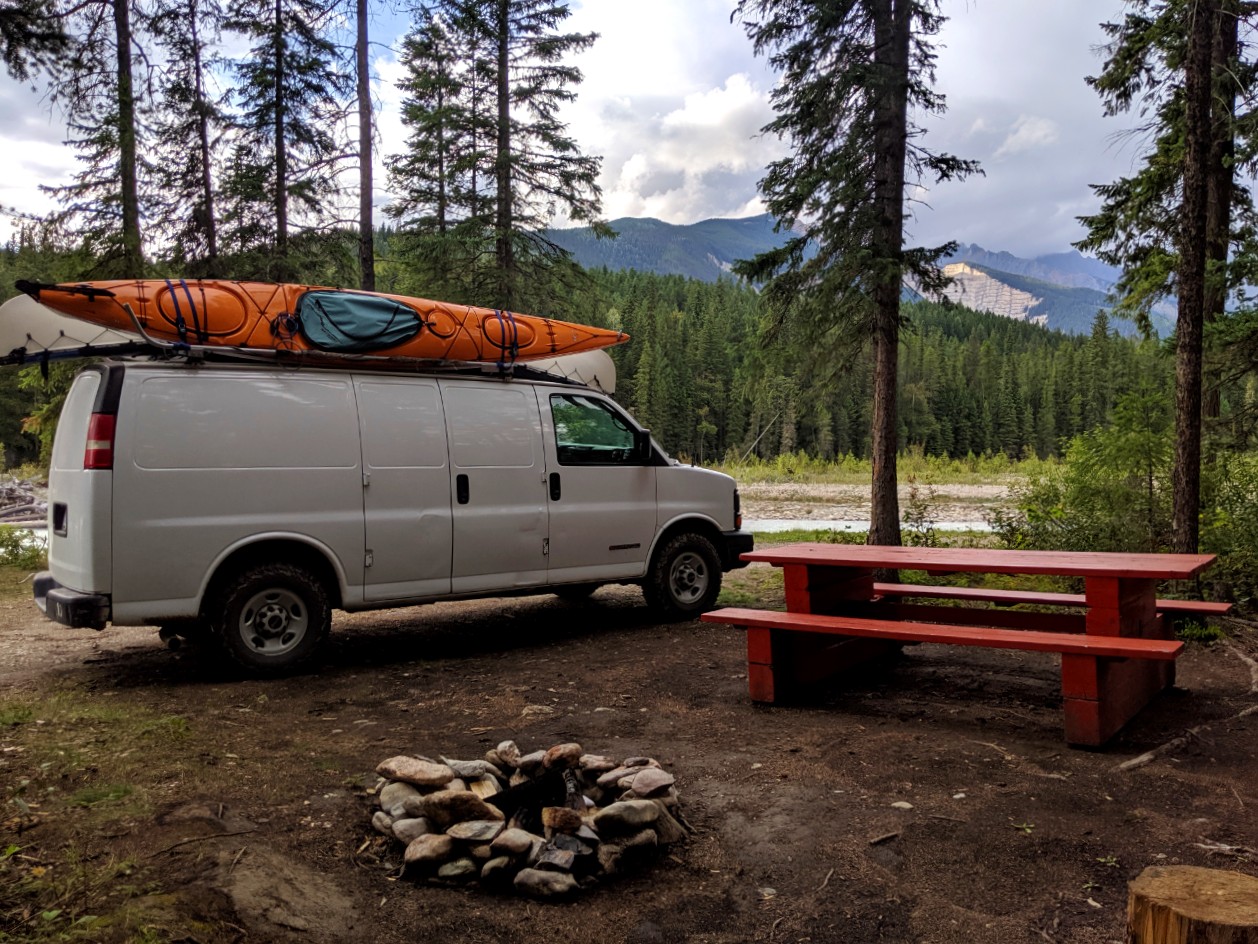
Backcountry necessities
- Always bring the 10 Essentials
- Know how to stay safe in the backcountry
- Understand how to avoid negative bear encounters
- Recommended gear is listed on our Shop page
- Need a packing list? Sign up to our newsletter for a free one!
How to Leave No Trace
Before getting into this post, I need to emphasize to you how important it is to Leave No Trace when camping in British Columbia.
Following Leave No Trace principles ensures that beautiful BC remains clean, beautiful and accessible for everyone (wildlife too!)
Here are some of the most significant things you can do to help:
- No toilet in your vehicle? Use the cathole method for proper waste disposal
- Pack out everything you bring in with you, including ‘natural’ items like banana peels and apple cores
- Camp on durable surfaces only, preferably areas that have previously been used for camping
- Build campfires in existing fire rings, keep fires small and extinguish them properly (or consider not having one!)
For more info and tips, check out our full Leave No Trace guide.
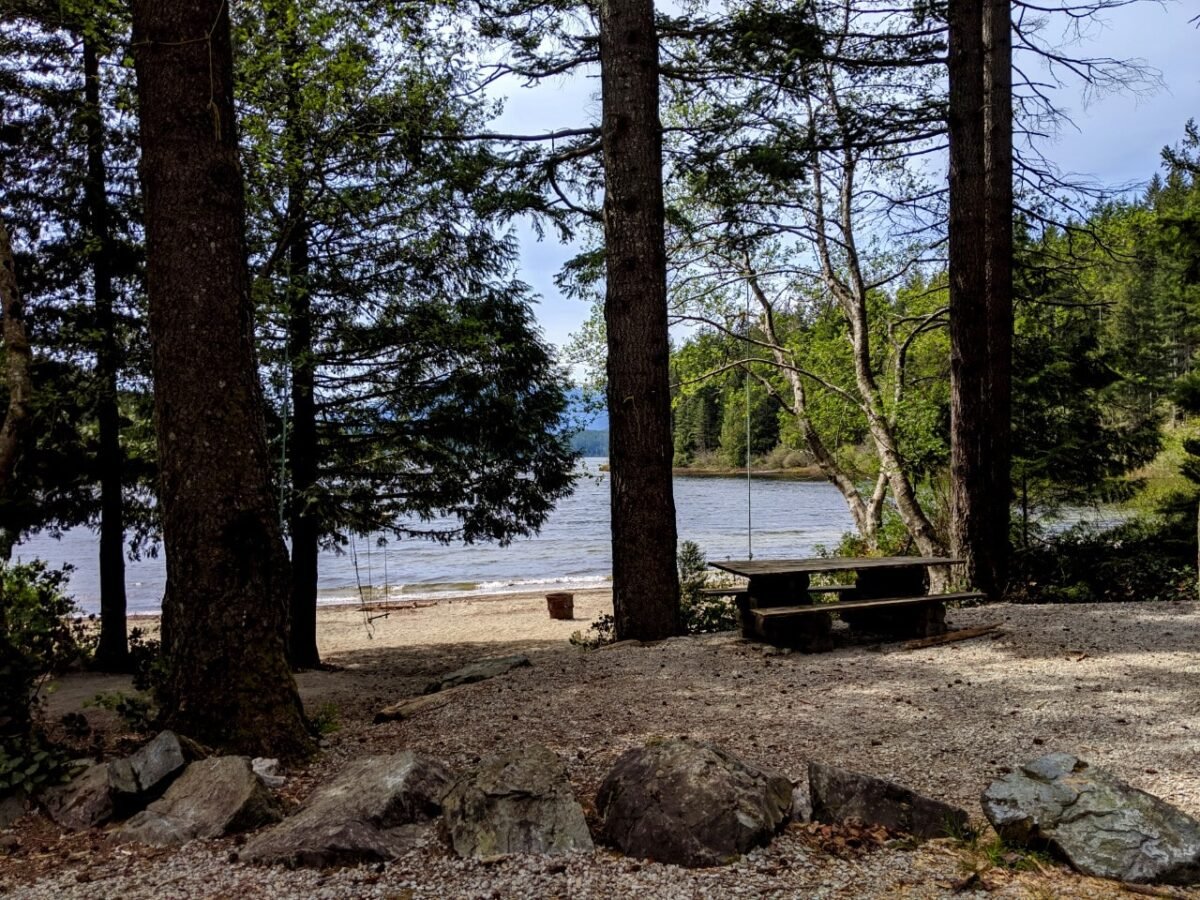
Free camping in British Columbia’s Recreational Sites
There are hundreds of free campgrounds all over British Columbia in the form of Recreational Sites.
These come under the umbrella of BC’s Ministry of Forests but are often managed by partnership agreements with:
- Recreation groups
- Private citizens
- First Nations
- Community organisations
- Local governments
- Forestry companies.
Most Recreational Sites are suitable for RV, van and tent camping.
A small minority of British Columbia’s forestry campsites are only suitable for tents due to their small size and/or difficult access.
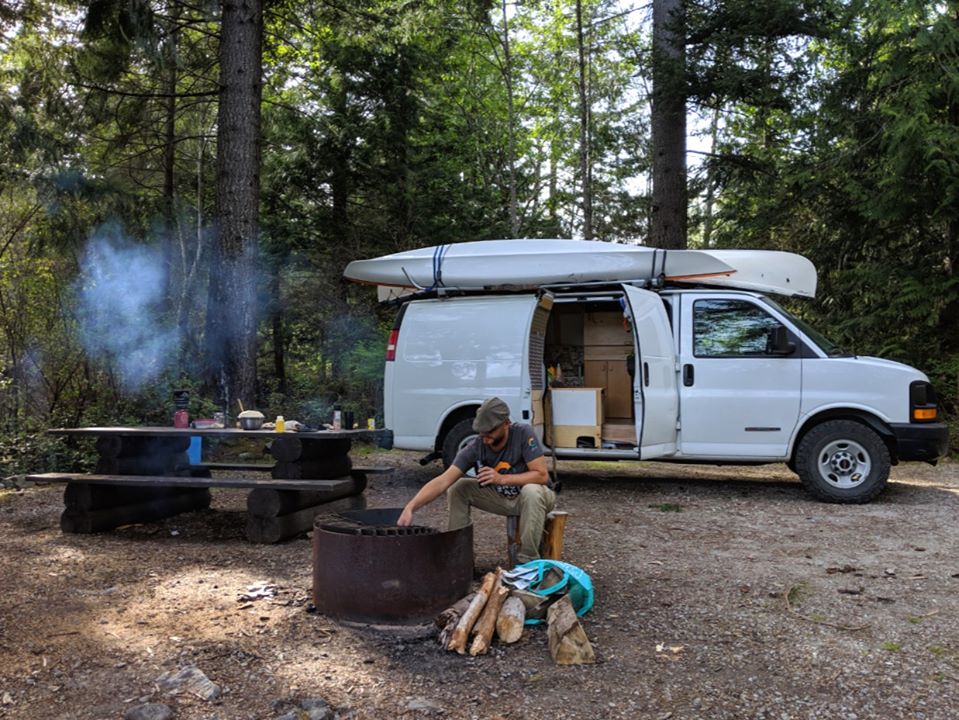
Recreational Sites in British Columbia: What you need to know
Before trying to find your first free BC forestry campsite, keep the following advice in mind:
- Rec Sites offer a rustic camping experience. They usually have at least one pit toilet (outhouse), fire pit and picnic table at a minimum. No electricity or potable water are available on site. Bring your own toilet paper!
- Rec Sites vary in size and style, ranging from large campgrounds (30+ spaces) that are maintained daily to the very small (space for just one camping party) that may only be checked a few times a year
- Sites are typically found in the middle of nowhere but are often located near a water feature such as a lake, river, stream or even the ocean

- Some Rec Sites provide open camping with no distinction between camping pitches while others have clearer dividers between spots, providing more privacy
- I would estimate that over 90% of BC’s forestry campsites are completely free to use. Some of the larger campsites do have a caretaker living on site and therefore have a nightly fee ($10-20 per party)
- The vast majority of Recreational Sites operate with a first come, first serve system. There are a few caretaker-run sites that now use reservation systems (mostly on Vancouver Island)
One of the most important things to keep in mind regarding Rec Sites is that they are typically reached via gravel roads, primarily built for industrial use (logging, mining etc).
If you are planning to rent a vehicle, you will need to choose a company like FarOut Wilderness who allow their vehicles to be driven on unpaved roads.
In addition to allowing more freedom to explore beyond the beaten path, their fully kitted out 4X4 trucks also have sweet rooftop tents for the most hassle free camping possible! If you tell them I sent you (with the code FOW-OTT-5), they’ll give you a 5% booking discount.

How to find free Recreational Site camping in BC
Due to Recreational Sites usually being located away from the main highways, it is unlikely that the average BC visitor or resident will accidentally stumble across one of these campgrounds.
The two main ways of finding recreational sites are:
- Using the Recreational Sites and Trails BC website
- With the help of the excellent Backroad Mapbooks series

While the Recreational Sites and Trails BC website is useful, I find Backroad Mapbooks a lot easier to use when it comes to actually finding BC forestry campsites.
As well as being detailed roadmaps, Backroad Mapbooks are also an amazing resource for finding campsites, trails and activities all over BC.
There are seven Backroad Mapbooks covering the entirety of British Columbia. We have them all an use them often for planning and navigation.
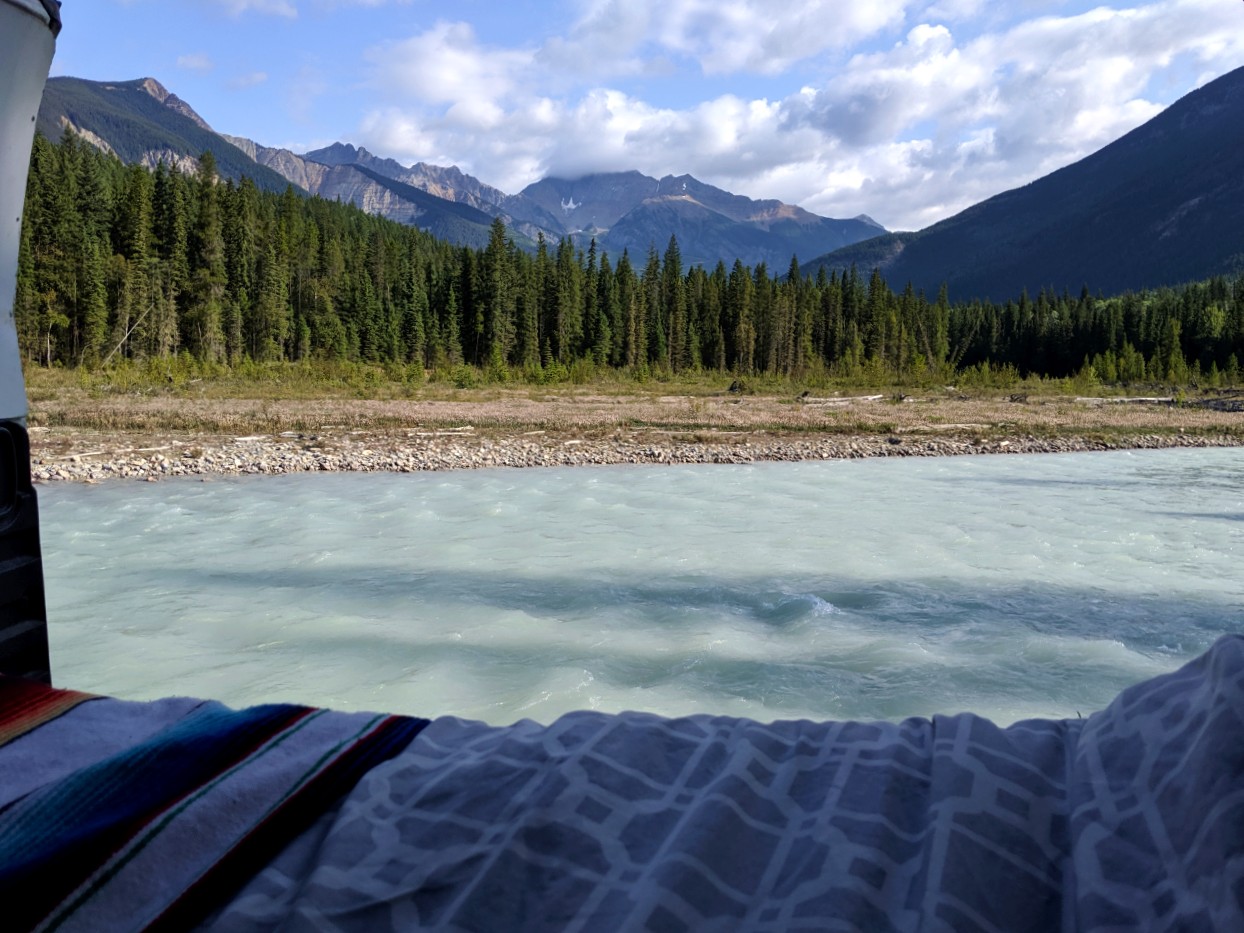
Using Backroad Mapbooks to find BC Recreational Sites
Recreational Sites are very easy to spot on in the Backroad Mapbooks (have a look below).
Rec Sites are shown clearly in red, with a tent or RV/tent symbol showing what kind of campsite. The name of the Rec Site is listed next to this symbol.
Towards the back of the Backroad Mapbook, there is an entire alphabetised section with a detailed description of each Rec Site.
This usually includes details such as how many campsites there are, what attractions are close by (good fishing? a waterfall? paddling opportunities?) and the condition of the road leading to it. If there is a charge to camp, a large dollar symbol is shown.
Read More: 9 of the Best Completely Free Campsites in British Columbia

Free camping options in BC’s Provincial Parks
British Columbia’s Provincial Park system also offers camping opportunities. There are two different types of camping available in Provincial Parks:
- Car-accessible campsites in well-maintained campgrounds for both tent, van and RV campers.
The fee for one camping party ranges from $15 to $38 per night in these campgrounds.
The more expensive campsites have showers, flush toilets and, sometimes, electricity. Many campsites are reserved in advance during the main summer camping season (late June to early September)
- Wilderness camping at marine and backcountry campgrounds for tent campers. Camping at these sites is free or costs $5-10 per night per person
Backcountry and marine sites are usually quite rustic, with just a pit toilet at a minimum. These sites are only accessible by foot or boat respectively.
Relatively common is the use of tent pads to preserve ground cover. Less common facilities include picnic tables, barrels for wastewater disposal and shelters.
Some Provincial Park backcountry camping sites are completely free all year round.
Others always have a fee or only charge during the main summer season (e.g. 1st May to 30th September).
Read Next: 25+ of the Best Campgrounds on Vancouver Island, BC
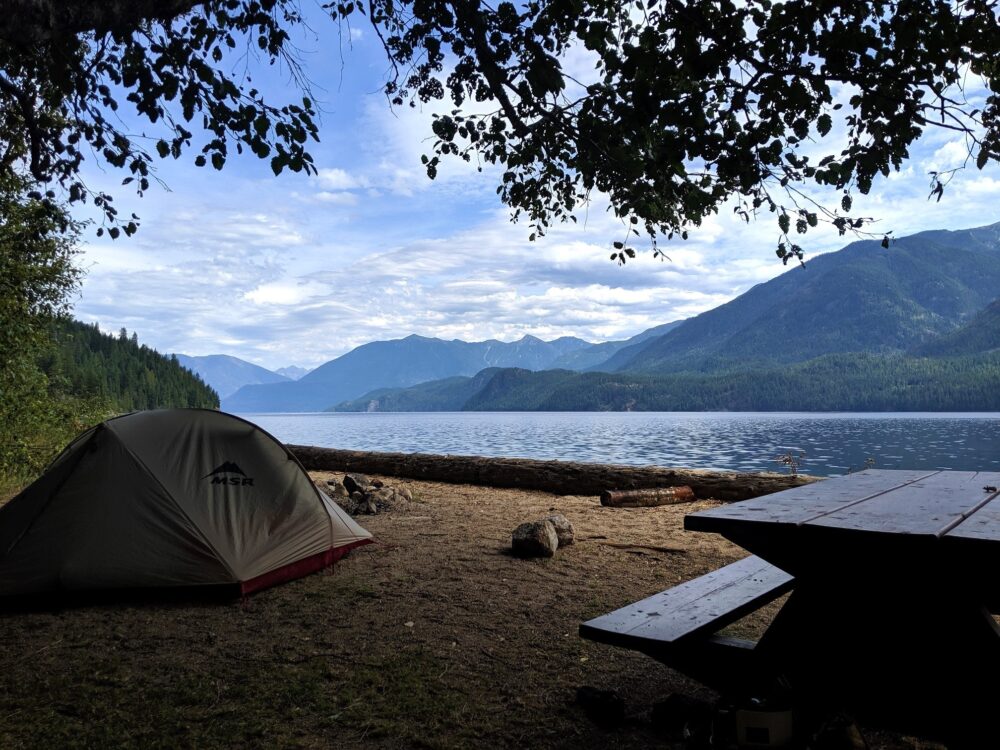
Out of season camping
Aside from prioritising the free backcountry sites, people trying to camp for free in British Columbia should also consider visiting the paid sites out of season (if the park is open and safe to visit).
We decided to hike into Cape Scott Provincial Park in late April to avoid paying the $10/per person/per day fee that is required during the main season.
This did mean, however, that we had to travel an unmaintained trail but we were prepared to do so.
Finding free wilderness campsites in BC’s Provincial Parks
My technique for finding free campsites in BC’s Provincial Parks is a two-step system –
- First, I check the relevant Backroad Mapbook for the area I want to explore. Provincial Parks are shown in green on the maps. Backcountry and marine campsites are noted with a black tent symbol as in the photo below.
- To find out whether there is a fee to use these sites, I look up the name of the Provincial Park on the BC Parks website. Right at the bottom of each park’s description page, there is a section about the wilderness camping opportunities, including any applicable fees and season dates.
Read Next: The Complete Guide to Finding Free Camping in Canada
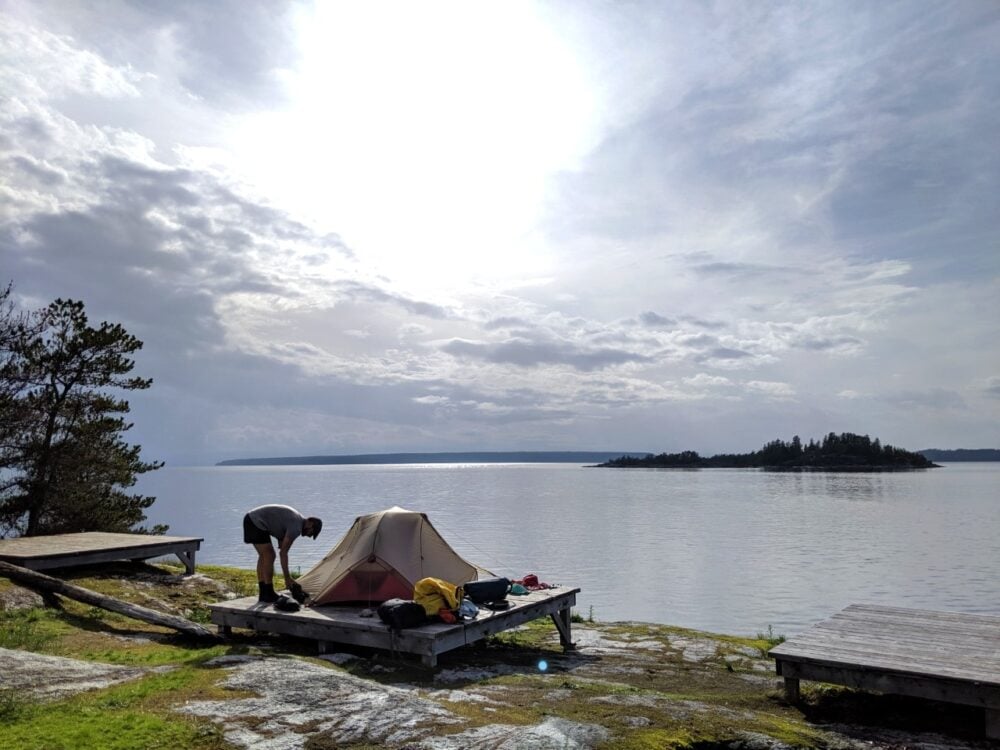
Essential tips when free camping in BC
- Leave your campsite in the same, or better, condition than when you first found it. This means taking all of your trash home with you and not damaging the local environment (the basics of Leave No Trace, as as previously mentioned!)
- Bring a water filtration or purification system with you. Drinkable water is not usually provided at Recreational Sites and backcountry Provincial Park campgrounds. We love, and regularly use, the BeFree water filter when free camping in BC
- Be prepared to meet loaded logging trucks on BC’s backroads. They tend to drive fast and have right of way. Adhere to all industrial signage on unpaved roads
- Pay special attention when driving at dawn and dusk. Large animals are more likely to be on the road and a collision can be deadly for both you and the animal
- Always be bear aware. Keep food and all smelly items (this includes toothpaste!) inside your vehicle when not in use. Remember, a fed bear is a dead bear
- Check for fire bans and campfire restrictions before heading out on your camping trip. Use existing fire rings, keep campfires small and completely extinguish after using
- Be prepared to have zero phone signal while in BC’s backcountry. Be sure to tell someone where you’re going and when you expect to be back
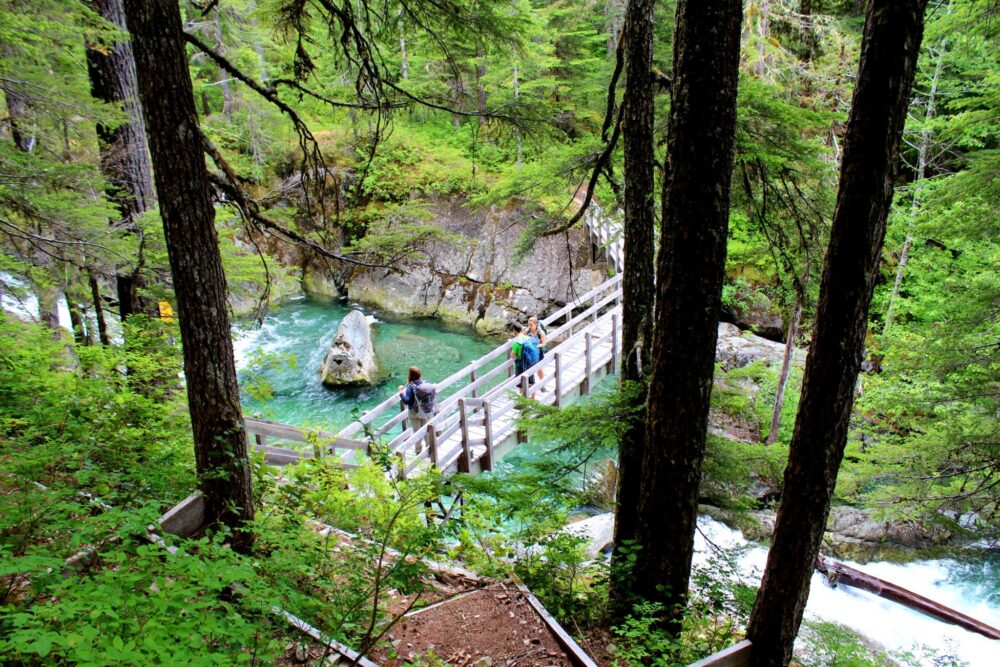
What to bring when camping in BC
The following are items we are always sure to bring whenever we head out camping in British Columbia.
- Lightweight tarp – Whether you’re in BC’s mountains or temperate rainforest, you can’t go wrong with carrying a lightweight tarp for shelter or shade. Rain is possible at any time of year
- Mosquito repellent – The mosquitoes in some areas of British Columbia can be brutal, especially in spring (May/June). Some kind of repellent is a must (I find the ‘Deep Woods’ kind most effective), and perhaps consider an appliance such as the ThermaCell
- Bear spray – I hope you never have to use it (and most people never do), but having bear spray is a good idea when exploring the wilderness of BC. Be sure to understand how to use it, keep it handy and also learn how to be bear aware (more info above)
- Portable air compressor – We once blew a tire on a logging road and with our spare tire being flat, we wouldn’t have got very far without our air compressor!
- Camping stove – Never solely rely on campfires for cooking food. Campfire bans can come in at any time or the wood may be too wet to light properly
- Lighting – Always bring a separate source of light, be it a headlamp (hands free!) or lantern. The latter is great for long evenings playing cards or hanging out by the fire
How to camp for free in British Columbia, Canada
And there you have it, my full guide to finding free campsites in BC. These techniques have led us to some incredible adventures over the last decade and over 200+ nights of free camping so far.
Read these other posts about camping in Canada next:
Car Camping 101: A Beginner’s Guide
How to go Camping in British Columbia Without a Reservation
The Complete Guide to Camping for Free in Canada
3 of the Best Places to Camp on the Gaspé Peninsula, Quebec
25+ of the Best Campgrounds on Vancouver Island, British Columbia
11 of the Best Campgrounds in Nova Scotia
Everything You Need to Know About Camping in Gatineau Park, Quebec
9 Awesome Free Campsites in British Columbia


PIN or save this post for future reference with one of the photos above!
Check out these recently published posts:

One half of the Canadian/British couple behind Off Track Travel, Gemma is happiest when hiking on the trail or planning the next big travel adventure. JR and Gemma are currently based in the beautiful Okanagan Valley, British Columbia, Canada. Consider buying us a coffee if you have find any of our guides helpful!

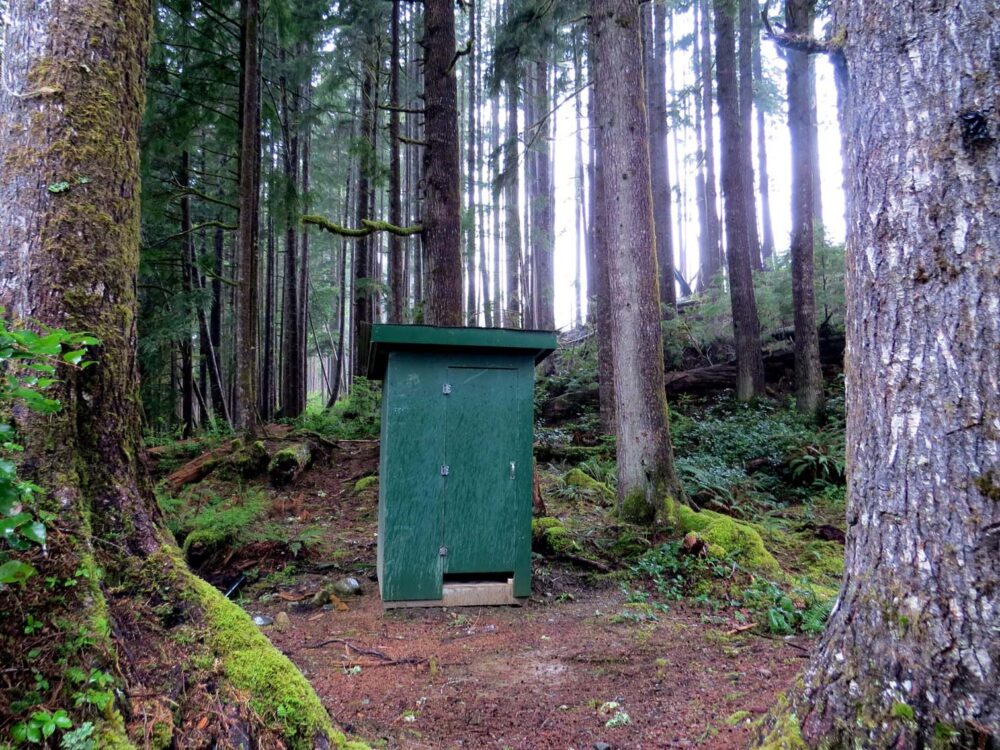
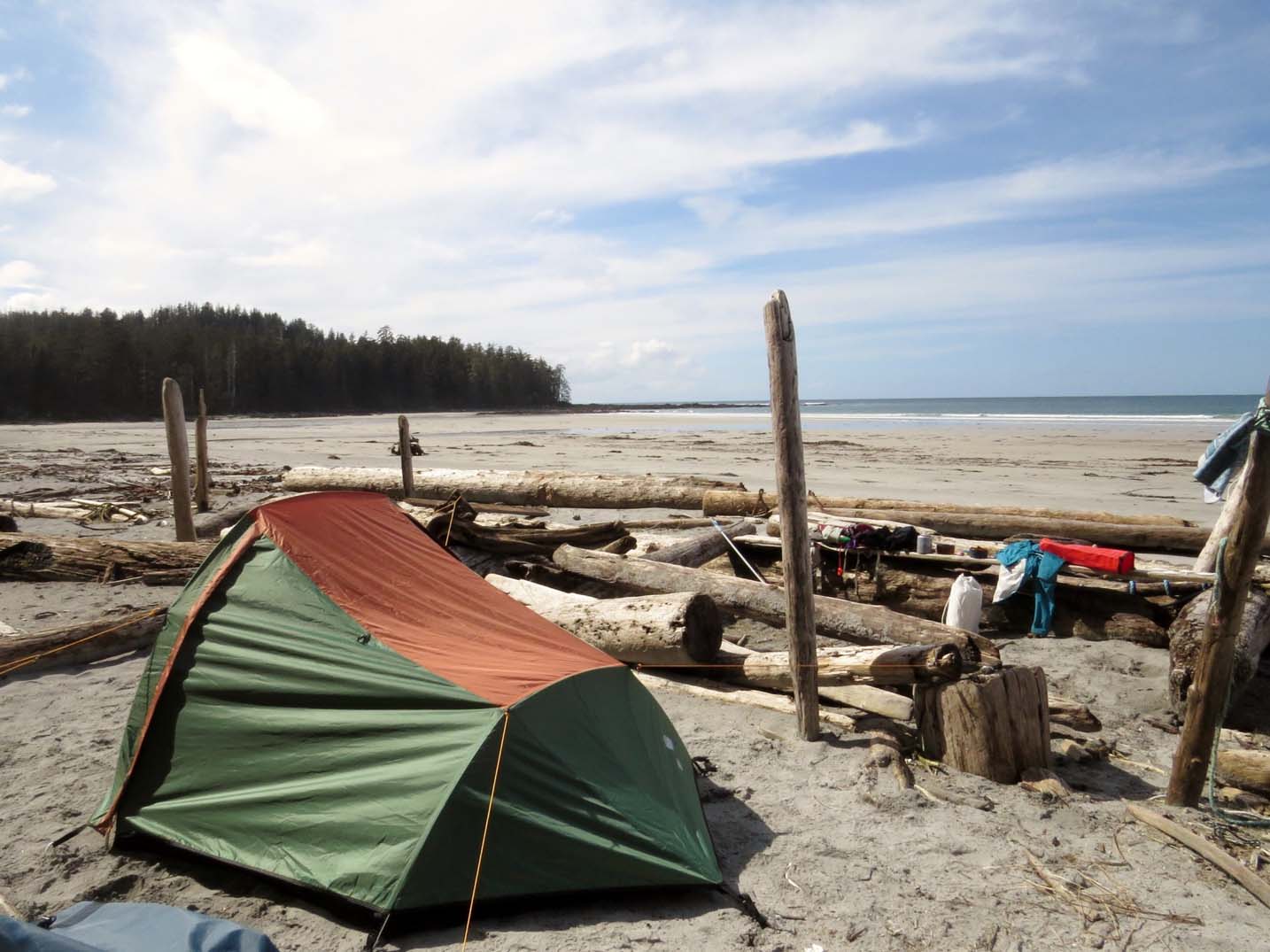

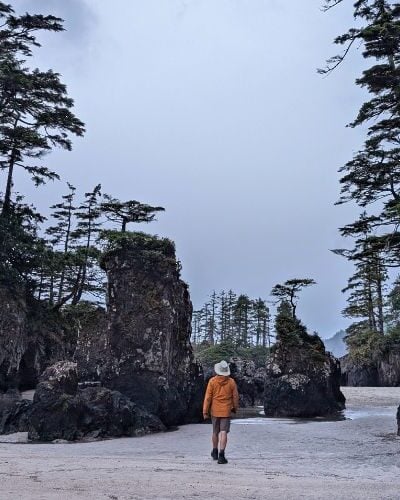

Great tips! I’m sure those rec sites will make up a big portion of my sleeping arrangements for my trip too 🙂 I will have to invest in the backroad mapbook. I haven’t done too much research online for free campsites but I did bookmark this while researching something else: http://freecampsites.net/canada/ Might be worth a look. Joe
Hi I’ve never camped before, so I was wondering if sleeping in the car is ok in BC?
Yes, it is. We have slept over 100+ nights at BC Recreational Sites and Provincial Parks in our various vehicles.
For the walk-in campsites , are there (relatively) safe places to leave your vehicle??
Hi Nat, I did reply to this a week or so ago but it was deleted in a website upgrade! We have never had any issues with leaving our vehicle at a trailhead. Always take regular precautions to prevent theft (e.g. taking valuables with you)
Hey there any recommendations for a place closer to the WA/BC border? Looking to go next weekend and love FREE (: bringing the dog and my hiking gear.. Thank you!
Hi Spencer! I haven’t explored this area too much myself – only a little in the North Cascades. I know there are some cheap (not free) Forest campgrounds in the Okanagon Forest area on the Washington side.
Hi would you mind posting the location names of each of the photos? Very beautiful locations! Thanks
Hi Andrea,
I have just updated the post with captions and some new photos!
Hi, it looks like all of the campgrounds are filled on the BC website. Wondering if you have some thoughts about which of the free campsites would be best when it is crowded in August
Hi Imran,
I imagine you are referring to the BC Parks website. Some BC Parks campgrounds have first come, first serve sites so you can try that. Otherwise, I would head to Recreational Sites that are further away from the highway.
Thanks for this awesome info! I think going off on what Spencer commented, I’m wondering if you could recommend any camping sites in BC that are closer to the BC/WA border…perhaps around Whistler? I live in Seattle, so I want to make the most out of a 4-day weekend camping trip to BC without having to waste two entire days driving! Thanks!
Hi Angela,
If you’re looking for vehicle accessible sites, there are a few Recreational Sites around Squamish and then a couple before Joffre Lakes. This is a very popular area, however, so if you’re visiting on a weekend I would recommend getting there early. For backpacking sites, there are lots of wilderness camping opportunities around Whistler but again, they do get very busy on the weekend!
I am planning a trip to Vancouver Island next summer and was wondering if camping in areas other than designated camp sites is allowed if you are not on “park” land. Obviously in a park you need to be in a designated spot, but if we are on a back road and see a suitable spot for a tent next to a lake or stream, is it legal to make camp there or is it a must to find a camp ground near by? Thanks – Klancy
Hi Klancy,
In most places, it is legal to camp temporarily on crown land i.e. land owned by the government (there are some provincial exceptions). In practice, it can be difficult for visitors to find out what is actually crown land without the proper maps. JR and I do sometimes park our van overnight outside of Rec Sites and Provincial Parks but we pick the spots very carefully – away from private land & houses, one night only, late arrival, early departure, and follow leave no trace principles. Having said this, since you are visiting Vancouver Island specifically, I would urge you to go to the Rec Sites since there are SO many on the Island, located in many beautiful places. And over 90% of them are completely free.
Hi guys,
Very useful post. Just wondering if these campgrounds require reservations in summer – I’m planning a cycle trip through BC this summer and I want to know if I can expect the campgrounds to be full or if we will just be able to cycle up and get a spot?
Thanks, J
Hi Jane! Recreational Sites work on a first come, first serve system so no, there are no reservations. If you arrive on a summer weekend, you may find some Rec Sites full due to popularity. My general rule is – the more accessible, the more popular so those that are reached by paved roads and/or a short easy drive on flat gravel roads will fill up in the summer.
There’s a 14-day limit to the free camping on BLM land in the States so…..
Does Canada also have a limit on free dispersed camping???
Thnx!
Hi Dove,
BC’s Recreation Sites have a 14 day per campground limit, yes. I will add that into this post when I next edit, thanks!
Hi Gemma,
We’re interested in camping at Slocan Lake in particular, are those camping sites along the West shore of the lake only accessible by taking Highway 6 down the East side and boating over? Or are there ways to drive down the West coast of the lake with an SUV?
Thank you so much for all of this wonderful info,
Hi Simon,
The western shore of Slocan Lake is water access only I’m afraid. I’d highly recommend renting or borrowing a canoe!
Great site,
Thank you for all the information!!!!!!!!!!!!!!!!!!!!!!!!
We are looking to spend the winter in BC, mostly on Vancouver Island and we want to go boondocking with our travel trailer.
Wondering if most sites at lower elevation are available year round?
Hi Bella,
The lower elevation areas of Vancouver Island do not receive much snow (if any at all in some years!) during the winter.
hey! super helpful tips. i might have missed it , but are these campsites usually first come first serve, or is there a booking process? thanks!
Hi Shay,
Recreation Sites are generally first come, first serve.
I am headed to BC Okanagan in June until September. Is there any REC Sites you can recommend to us with waterfalls and or Hotsprings. We have a Forest River Salem 22 ft . Any info would be appreciated. Thank you so much for your great info!
Hi Gail,
I’m glad you found the post helpful! Unfortunately, there are no hotsprings in the Okanagan unfortunately (I wish!) The closest would be Nakusp, Halfway and Halcyon in the Slocan Valley and then Ainsworth near Nelson. Halfway Hot Springs has a Rec Site campground within easy walking distance to the springs. The campground is not free, however. The rate is $15/night with a reduced fee for seniors.
Sadly, I don’t know of any Rec Sites near waterfalls in the Okanagan either! There isn’t a ton of waterfalls here in general and most do not have any campgrounds near them. The campgrounds that are close to waterfalls are usually provincial parks rather than Rec Sites e.g. Fintry Falls is located in Fintry Provincial Park, Bear Creek waterfall is in Bear Creek Provincial Park.
Hi there, where is this place in Golden? I would love to go. Also any great resources for camping in BC. I have the backroad map but it doesn;t show much for this area. Thank you 🙂
Hi Steven,
If you are referring to the first photo, it is Waitabit Creek Recreation Site near Golden. There are a few Rec Sites in this area, as noted on the relevant Backroad Mapbook. That would be my top resource for the area for sure.
@Gemma, Thank you so much! 🙂